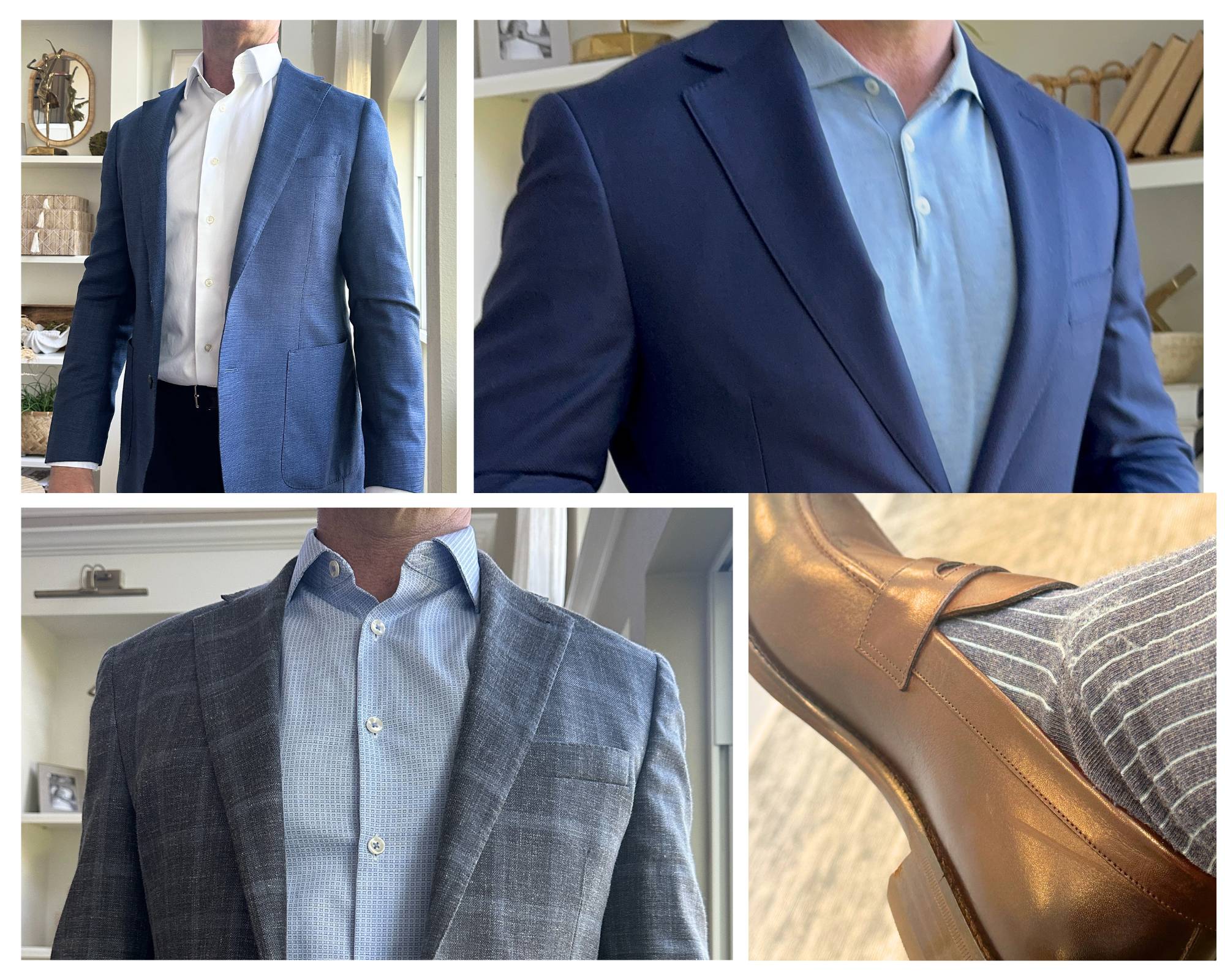
In today’s professional world, knowing how to dress appropriately can make a big difference in how you’re perceived. Whether you’re starting a new job, presenting at a meeting, or want to make a good impression, your appearance reflects your attitude and confidence. Two of the most common and essential dress codes you’ll encounter in modern workplaces are business casual and smart casual.
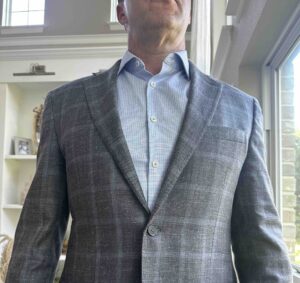
Abboud Gray/Blue Blazer and Dress Shirt
This guide will help you understand how to dress in a business casual style in a professional setting. We’ll also explore how the smart casual look is a great way to showcase your personal style without coming across as unprofessional, and how to navigate Casual Fridays without slipping into weekend mode.
Business casual is a step down from formal business wear, but still appropriate for most office environments. It strikes the perfect balance between looking professional and feeling comfortable.
For men, a solid business casual wardrobe includes:
– A button-down shirt or Oxford shirt, preferably in neutral colors like white, light blue, or gray
– Chinos or dress pants in navy, black, or khaki
– A sport coat or unstructured blazer to elevate the overall look
– Leather loafers, suede shoes, or polished dress shoes
– A matching leather belt
– Optional: A tie (knit or patterned ties work well)
In colder months, layering with a sweater over your button-up shirt is also an excellent choice.
Dressing in business casual shows that you take pride in your appearance and are serious about your work. Your office wear becomes part of your brand. Showing up in clean, well-fitting clothes tells your team and your managers that you’re dependable, organized, and focused.
Even if your workplace doesn’t require a suit jacket, dressing business casual gives off an impression of competence and respect for the company culture. If you’re aiming for promotions or want to be seen as a leader, start by dressing like one.
Many workplaces allow employees to wear casual outfits on Fridays, giving them a chance to relax. But too often, people interpret “casual” as “sloppy.” On Casual Fridays, it’s important not to drift too far into weekend territory with your clothes.
Instead of gym clothes or worn-out jeans, aim for smart casual attire that still feels polished:
– A clean pair of jeans (dark and without rips)
– A polo shirt or long-sleeve button-down shirt
– Suede shoes or casual leather loafers
– A lightweight sport jacket or unstructured blazer
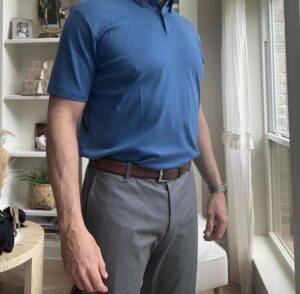
Blue and Gray – Best Business Casual Combo
These are all comfortable, relaxed, yet professional options that won’t make you look underdressed if you run into your boss or a client.
The smart casual dress code gives you more flexibility to blend fashion and professionalism using the right pieces. It’s the go-to choice for creative workplaces, after-hours events, or summer months when formal wear feels too stiff.
A strong, smart casual outfit for men might include:
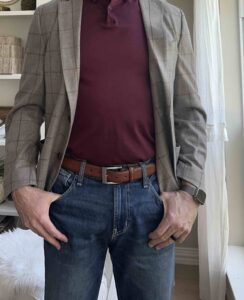
Smart Casual – Polo, Blazer, Dark Jeans
– Slim-fit chinos or dark jeans
– A tucked-in polo shirt or dress shirt with subtle patterns
– An unstructured blazer, cardigan, or casual sport coat
– Stylish suede shoes, leather boots, or designer sneakers
– Optional: A casual tie or accessories like a bracelet or leather-strap watch
Smart casual means looking sharp without trying too hard. It allows you to show off your personal style while still respecting the workplace.
It’s easy to confuse business casual and smart casual, but they serve different things. Here’s how they compare:
Business Casual:
– Tucked button-down shirts, Oxford shirts, polos
– Chinos, dress pants
– Blazers, structured sports jacket (aka sport coat)
– Suede or Leather Oxfords, loafers, derbies
– Leather belt, classic watch
Smart Casual Dress Code:
– Polo shirts, Henleys, dress shirts with flair
– Dark jeans, a comfortable pair of chinos
– Sport jackets, cardigans, unstructured blazers
– Suede shoes, boots, designer or minimalist sneakers
– Trendy watch, statement belt, bracelets
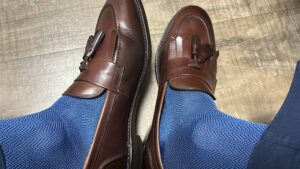
Tassel Loafers – Business Casual With Class
Choose business casual for meetings, interviews, or important office days. Go with smart casual attire for networking events, creative environments, or informal team gatherings.
One important tip for both styles: understand your body type. Clothes that fit well will always look better than expensive pieces that don’t. Tailoring can make a big difference in how confident and put-together you feel.
1. Stick to Neutral Colors: Navy, gray, black, and white are timeless and easy to mix and match.
2. Avoid Wrinkles and Stains: Prep your outfits the night before so you look fresh and ready.
3. Invest in Key Pieces: A few great button-down shirts, dark jeans, and an unstructured blazer can anchor dozens of outfits.
4. Layer Wisely in Colder Months: Add sweaters or light jackets for both warmth and style.
5. Keep It Clean: Trim your hair, polish your shoes, and don’t forget the small details.
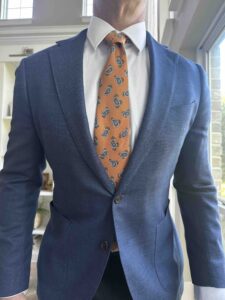
Business Casual Dressed Up w/ a Tie
Your overall look can shape how others perceive your intelligence, dedication, and trustworthiness. Whether you’re dressing business casual or putting together a smart casual outfit, you’re sending a message. People notice—and remember—how you present yourself.
Don’t underestimate the power of a great casual ensemble. Even relaxed clothing can show effort and intention if it’s clean, well-fitted, and styled with care.
Dressing well is about more than just clothes—it’s about mindset. The business casual and smart casual dress code helps you dress in a way that fits modern workplaces while showing confidence and character.
Even on Casual Fridays, avoid dressing too relaxed. A polished, thoughtful look will always put you ahead. Whether it’s a crisp white shirt, tailored dress pants, or the perfect sport coat, how you dress reflects who you are.
Take the time to build a wardrobe that fits your role, goals, and personal style. When you look sharp, you feel sharp—and that’s always a smart move in any workplace.